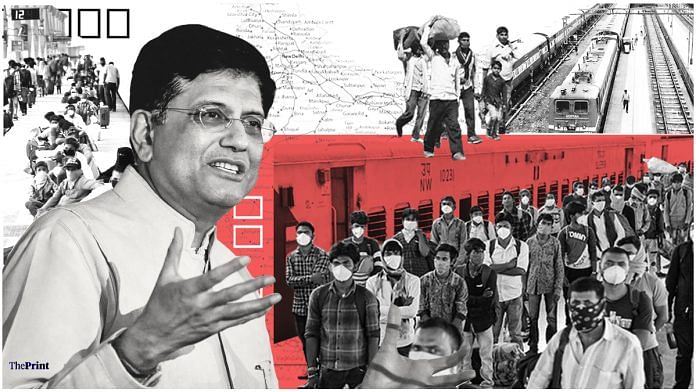The Indian Railways reacted to the controversy over ‘stray trains’ by calling it “route rationalisation” of Shramik Specials, which are meant to ferry migrant workers back home. Shiv Sena leader Sanjay Raut took a dig at railway minister Piyush Goyal Monday over diversion of the Vasai Road-Gorakhpur train via Odisha. The Kerala government also attacked the Narendra Modi government Tuesday for sending a train from Mumbai without intimating it.
ThePrint asks: Stray trains: Poor planning by Indian Railways or overwhelming load on some routes?
Corporatisation of railways to be blamed for the current mismanagement
 Dinesh Trivedi
Dinesh Trivedi
Former Union railway minister and Rajya Sabha member
As far as efficiency is concerned, Indian Railways is comparable to the Indian Army. Let’s not forget that the former works on a shoestring budget and yet it is used to ferrying about 20,000 trains and 23 million passengers on a normal day.
This is the 168th year of the Indian Railways. The main reason why Shramik trains are straying is not poor planning or overwhelming load on some routes. The cancer is growing somewhere else, which is the recent change in the government policy of corporatisation of the railways and the fundamental changes in the management structure. The morale of the Railways staff from board members to a gangman is at its lowest ebb. The chain of command is lost and the Indian Railways as an organisation is losing its direction. The organisation’s structure has been upended by bureaucrats far removed from the ground realities.
Other than the fact that the lockdown has put protocols in disarray, the chain of command in the railways has also been ruptured. After all, they are run by people who are also facing job uncertainties. Therefore, calling upon their services at the eleventh hour will naturally breed problems and disturb the entire structure of the national transporter.
I suggest policy-makers go back to the drawing board and refrain from disturbing the basic structure of the railways. They also need to involve the railway union, former railway board members and experts in decision-making.
States not following timely completion of pre-boarding formalities has affected train schedule
 Arunendra Kumar
Arunendra Kumar
Former Chairman, Indian Railways
The reason for stray trains is the complete lack of adherence to a planned train schedule from the very beginning, and it was not under the Railways’ control. States have not been able to follow timely completion of pre-boarding formalities. This affects the timeline of charted trains and, thus, the efficiency and choice of train routes.
Trains are charted according to strict time slots, which platforms they are meant to pass through, the duration of their halt at given stations and reception infrastructure at destinations. Passengers dispersing on time also factors in. Diversions arise when these protocols are not adhered to.
If a train is to leave a station at 11 am but the pre-boarding formality is only completed by 5 pm, then the train route is hindered and fresh charting is required. Obviously, the train shall be out of path then. Fresh charting for routes that cover long distances is no child’s play. The Train Control Centre has a special sensitivity for Shramik Trains, but problems arise when there is uncertainty built into train operations.
Now, there is another issue with regard to providing food free of cost on Shramik trains. Apart from the financial burden, providing food may extend a train’s halt at a particular station. Meal provisions are made according to train charts, not last-minute fresh charting, which means lunch can end up being served as dinner. Yet, the Railways have done a commendable job given the imponderables.
Shramik Specials going stray another example of Modi govt’s mishandling of Covid-19 crisis
 Ajay Shukla
Ajay Shukla
Former member of traffic, Railway Board
The chaotic way in which the special trains for migrants have been operated in the last few days is yet another example of the ham-handed approach of the Modi government’s handling of the corona epidemic. In fact, for the hapless migrant workers, the government seems to be a bigger problem than the epidemic itself.
When the lockdown was first extended, the government initially took the rigid stand that no one would be allowed to move. Unable to take care of the out-of-work labour force, the state governments began to take steps to send them back to their homes, but the Modi government remained adamant. However, as situation started to get out of hand, it panicked and began running special trains without a time table. The result was obvious.
It is futile to blame route congestion for all this. In normal circumstances Indian Railways runs a much heavier traffic. At a time when all scheduled trains are suspended, running the special trains should not have been such a problem. It only shows lack of planning and foresight.
Modi government should run passenger trains at full capacity to ferry migrant workers
 Harsh Mander
Harsh Mander
Retd IAS officer and social activist
The failure of the Narendra Modi government in handling the migrant workers’ crisis will haunt us for decades. Initially, the government barred all movement across state borders for fears it would spread the infection. But this alibi wore thin as special flights were arranged for those stuck abroad, and buses for stranded students within India. It became clear that the Modi government was unwilling to organise the travel of migrant workers because it wanted to ensure the availability of the labourforce when the economic activity resumed. Or, may be, because it did not care.
Even when the nation-wide outrage compelled the Modi government to run trains, these were too small in number to transport even a fraction of those needing to travel. The migrant workers had to face cancelled trains and diverted routes, apart from the unseemly compulsion of paying for tickets. According to some estimates, there are around 40 million migrant workers in India. And before the lockdown, the railways ran 13,452 passenger trains, transporting 23 million passengers daily. This should give us some idea about the gap between demand and operational supply of the Indian railways.
The government should restore its full passenger train operations, and reserve all seats for a week for free travel of migrants on a first-come-first-serve basis. The government has full capacity to accomplish this, but is bereft of the will and the compassion required to do so.
Goyal is committing more trains from all districts without paying attention to the capacity of railways
 Sanya Dhingra
Sanya Dhingra
Special Correspondent, ThePrint
Even when millions took to walking on the roads and railway tracks to go back to their homes, it took a month for the Modi government to finally arrange Shramik trains – for which migrant workers themselves were asked to pay. But with the migrant exodus still unravelling, instead of clinically optimising the available resources of the railways, the government has chosen to overload it to score political brownie points.
Receiving flak for mismanaging the migrant crisis, the railway minister has constantly been committing a larger number of trains from all districts, and seeking to increase the number of migrants on each train, without much attention being paid to the capacity of the railways. The fact that the railways is working with a largely disgruntled bureaucracy has only made matters worse.
The unplanned increase in the number of trains has led to congestion on routes, with most trains converging in Uttar Pradesh and Bihar. And while the railways claims that the derouting is deliberate, and no trains have been “lost”, it remains curious how a UP-bound train from Maharashtra wound up in Odisha.
While the railways should have been applauded for almost single-handedly trying to ferry migrants to their homes, the political wrangling and unpreparedness of the Centre has left the national transporter red-faced, scrambling to cover up for a new embarrassment every day.
Also read: Yogi vs Uddhav vs Piyush Goyal: Will politics over migrant workers hurt economic revival?
By Pia Krishnankutty, journalist at ThePrint




As long as there is no cross check and accountability ,any thing can be spoken in press conferences or else we only ask the question and tell the answer. That is what is practiced.
The Rly Minister follows the lie Lama like a faithful pet. He is good at running trains without railway lines.
The Govt. Committed a a big mistake by not organizing the labourers to travel since the beginning of lock down. This would have reduced population in urban areas where it is dense and dispersed it to the rural areas,. Of course precautions should have been taken. This would have reduced the pressure on the railways now and the population movement could have been more organized. Right now population is desperate which is causing the the run on Railway Stations with almost zero social distancing and other desperate actions which could have been as avoided.
A million deaths are a statistic, one is a tragedy. One hopes someone of good conscience in IR will watch the video clip of a toddler at Muzaffarpur station trying to wake up her mother who has perished after spending four days, hungry and thirsty, in summer heat in a train. Even a stone’s heart would melt after seeing how ordinary Indians have suffered in the last two months.
Given the normal, peacetime capacity of IR, this should have been a walk in the park. Sadly, the system is being overwhelmed. Passengers dying on trains after 60 hours without food and water. We saw how a railway foot over bridge collapsed in Bombay about a year ago, with tragic loss of life. Our strengths seem now to lie on social media and glitzy PR campaigns.